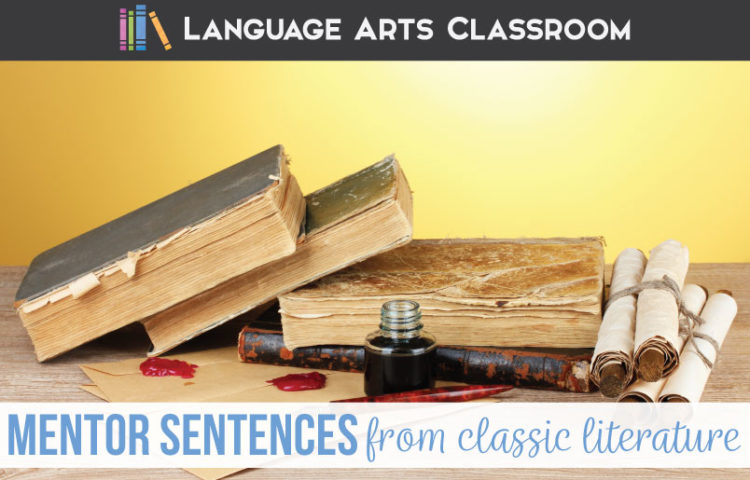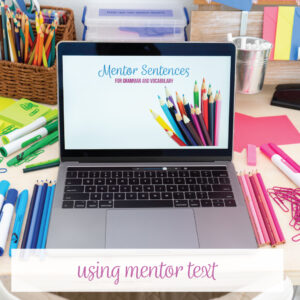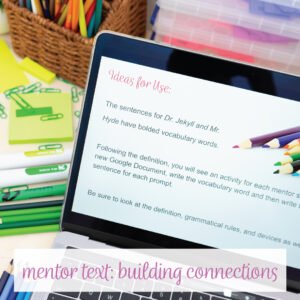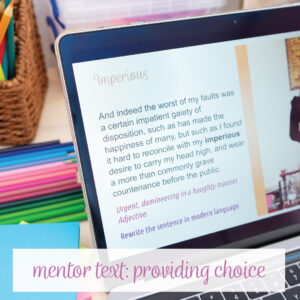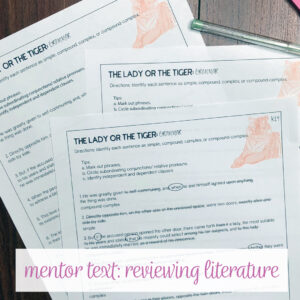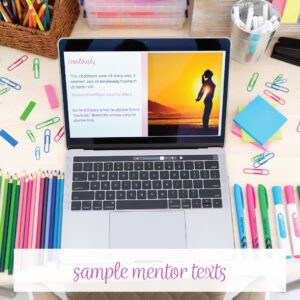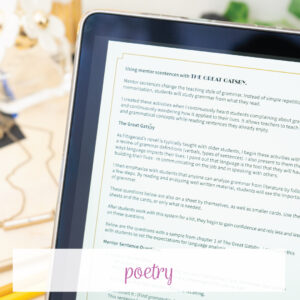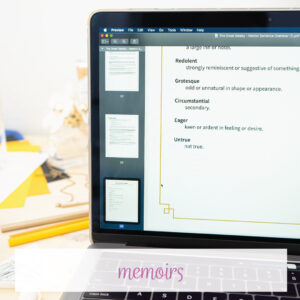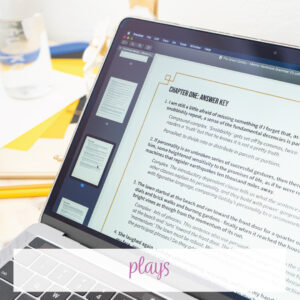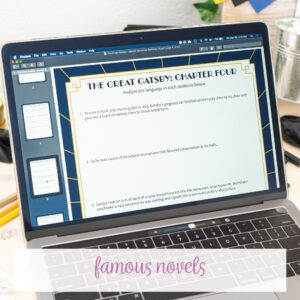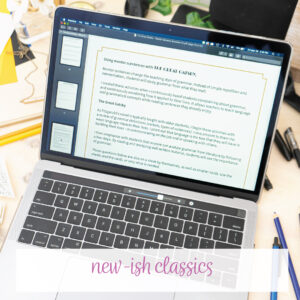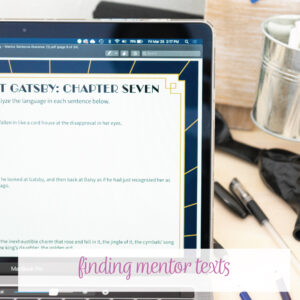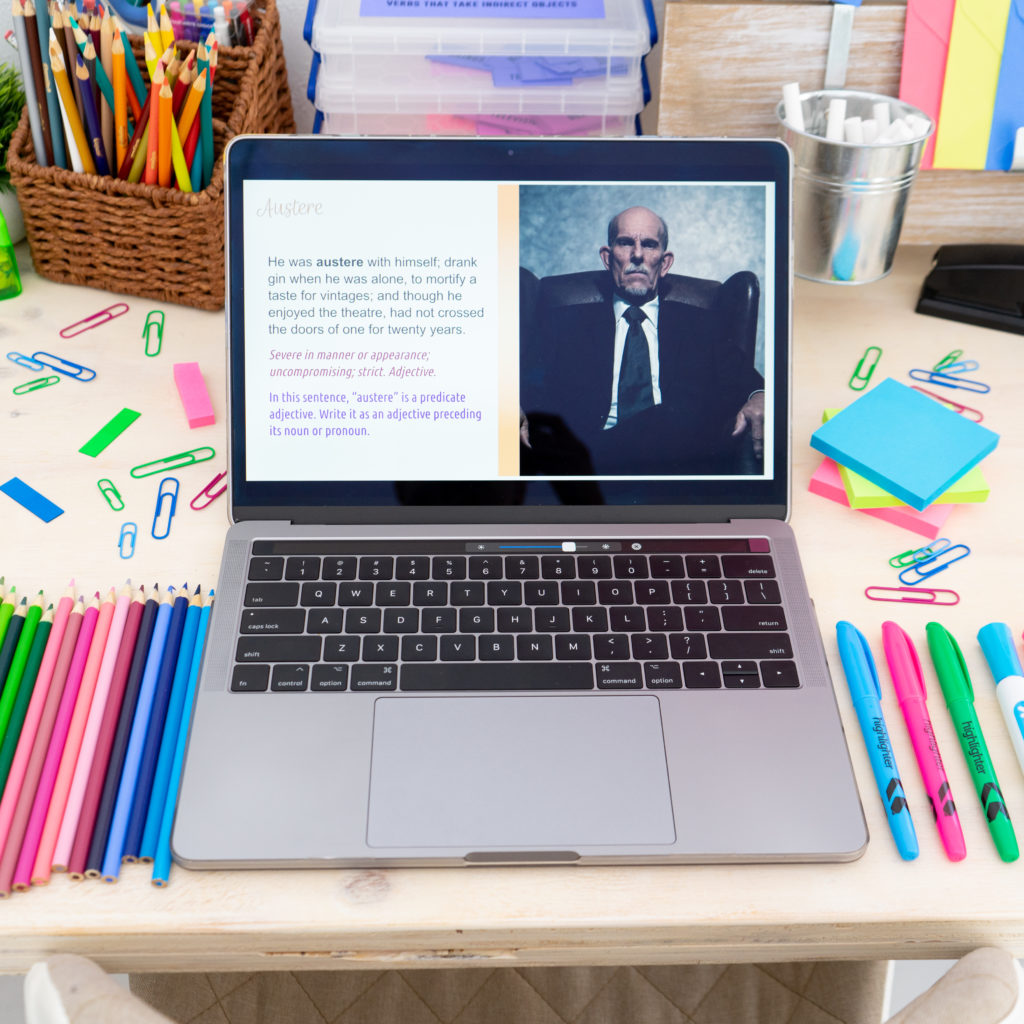You will be able to pull mentor sentences from classic literature once you start looking at literature with language standards in mind. You will own powerful tools for adding deeper meaning to your grammar lessons.
How can mentor sentences from classic literature help students improve their writing skills?
Mentor sentences from classic literature provide students with examples of well-crafted sentences, showcasing elements like sentence structure, grammar, and literary devices. By analyzing and emulating these sentences, students can enhance their own writing skills by learning from the best in literature.
A backstory to using mentor sentences
Using sentences from literature brings rich discussions to the classroom, and those sentences are wonderful ways to connect grammar to writing. Really!
Today, my students and I read Act IV of Romeo and Juliet. Juliet says to Paris, “I will confess to you that I love him.” What is the antecedent of “him”? To Juliet, “him” is “Romeo.” Paris thinks she is referencing him.
It was the perfect opportunity to use domain-specific language and to discuss antecedents, pronouns, and purposeful use of syntax. Grammar and language in context—it makes my heart sing. The entire conversation was probably a minute, but it added another layer of retrieval for my students. I have not done direct instruction of pronouns for months, but my students did remember the terms and could identify the situation.
With this spontanous sentence example, we had a great conversation. Naturally, we discussed language using mentor sentences from classic literature.
We maybe have not done official work on pronouns in some time, but we work on unclear antecedents and subject-verb agreement with pronouns (especially indefinite pronouns). Now, students and I have another discussion point when conferencing for writing, another grammar to writing connection: remember when we discussed pronouns with Romeo and Juliet. . . ?
Using mentor sentences from classic literature to teach grammar can occur with any text—modern or classic readings. Below, I have ideas for finding mentor sentences, but first, I cover some benefits your students will experience with a variety of mentor sentences.
Benefits of Mentor Texts in ELA
What are the benefits of incorporating mentor sentences from literature into other parts of class? The more I experiment with implementing texts into grammar lessons, the more our discussions about language improve. Classes see a deeper understanding of domain-specific vocabulary in context, beyond simple memorization.
After a quick brainstorming, I came up with these benefits for using mentor sentences from classic literature to teach grammar:
Connecting language to the modern word.
Students must connect grammar lessons to their world. For language standards to stick, we must connect grammar concepts to other understandings. Sometimes students think grammar is “ten minutes and done.” The problem with any grammar program that promises to teach language skills in a few minutes is that students will not apply their grammatical knowledge to other concepts and will therefore struggle to remember that knowledge.
If students never do anything with their new information, they will not experience deeper learning. This quote from Actively Learn nicely shows that:
Retaining knowledge requires students to fully understand the material and to believe that it matters. Instruction that emphasizes discussion, extensive writing, application of concepts, and building on ideas over time achieves this objective because it asks students to actively construct knowledge and to draw on that knowledge to generate something new. Instruction that emphasizes surface-level recall of content and a curriculum comprised of disconnected supplemental texts fails on both counts.
When teachers apply grammatical knowledge to literature (or a speech or an informational text), we are asking students to create something new. Often, we secondary ELA teachers create a meaningful discussion together and determine the effect of language. Mentor texts also allow us to scaffold the information with different grammatical concepts. We can find a concept (parallelism, sentence structure, verb voice) that students understand and build from there.
Additionally, we are asking students to believe language matters. Understanding that writers and speakers manipulate and use language to their advantages is vital for students to know.
Providing choice.
We can employ student choice with mentor sentence examples. In high school English, we often have an entire book or play at our disposal!
When I choose a sentence that inspires me, but a class finds that sentence a bore, we return to our books and find a new one. Along the way, we discuss what language excites us. Part of dynamic grammar lessons is showing students that our language and how people use that language is interesting. Sometimes, students and I sit with books, finding interesting action verbs or unique sentence structures.
We can also provide choice in what we do with the mentor text. Studying grammar with mentor texts helps, but writing with mentor texts is helpful too. For example, if students struggle to employ commas with sentence structure correctly, pull some mentor sentences for modeling correct usage. Practice writing from the mentor texts.
Reviewing literature.
As you meet language standards, you are naturally talking about the material. For instance if you use a quote as a mentor text, you and students can discuss the sentence pattern or vocabulary used. You can easily transfer to discussing the circumstances in which a character spoke, and all of those effects on the character. For example, adding grammatical concepts to your short story lessons only deepens students’ understanding.
I’ve used mentor texts with middle school students successfully, and I am finding success with high school students too. I love connecting grammar lessons to other parts of class, and mentor sentences help me meet numerous standards. I’ve used mentor sentences from books that students have and have not read. (Sometimes, a mentor sentence can spark interest in reading a book for a student.)
Sample Mentor Texts
The connection from Romeo and Juliet also made me wonder what other mentor sentences from literature I could find. I went on a grammar hunt and sought my favorite classics. Modern pieces make fabulous mentor texts too, but I wanted to model these ideas for you with texts that are in the public domain. Feel free to copy and paste these mentor text examples into your lessons.
I, Too
To begin, poetry has a depth of beautiful sentences. I looked at “I, Too” by Langston Hughes:
I Know Why the Caged Bird Sings
To be left alone on the tightrope of youthful unknowing is to experience the excruciating beauty of full freedom and the threat of eternal indecision.
I taught Caged Bird in its entirety for the first time this past year, but I always finesse this line into a creative writing class. Every word in that sentence matters, counts.
Why is youth a tightrope? Young age is certainly a time of unknowing, of not realizing what you don’t know.
Does youth provide “full freedom”? Students always argue that point, and from knowing what the public understands about trauma now compared to when Angelou wrote this, I always listen to my students when they argue that point. Some relish that they have freedom, and for that, I’m happy. Others question freedom in youth, and I remind them that “excruciating beauty” was used to describe it. The language in Angelou’s quote inspires lengthy and inspired discussion.
The modifiers haunt me in this quote: excruciating, eternal. So specific, so haunting.
A Raisin in the Sun
A Raisin in the Sun is my favorite play, ever. I’ve taught it numerous times and use it to meet a multitude of standards. The language is vibrant, and I can normally engage students with a few mentor pieces.
Mama to Beneatha:
There is always something left to love. And if you ain’t learned that, you ain’t learned nothing.
That portion from Mama might be my favorite line in Raisin, and that play has some fabulous ones. The direct address of “child” characterizes Mama: she is the matriarch, and she is leading her family through troublesome times. The direct address and comma build suspense as well. Beneatha does not see herself as “Child.” Mama, however, knows Beneatha lacks empathy toward Walter. Without commenting directly on that, she shows Beneatha who the teacher is.
Plus, you can study sentence structure in a play. “Well then, you ain’t through learning—because that ain’t the time at all.” Mama’s sentence is a complex one. Why would Hansberry choose that construction? Provide students with several examples of mentor sentences, and analyze the sentence structure in literature.
As I’ve read this play numerous times over the years, I am increasingly impressed how Hansberry built each character’s dialogue. This quote is the perfect mentor sentence to teach colloquialism.
The Great Gatsby
Is it cliche to enjoy The Great Gatsby? Maybe, but I love the symbolism and narrator. Take this example from Nick:
So he invented just the sort of Jay Gatsby that seventeen-year-old boy would be likely to invent, and to this conception he was faithful to the end.
Fitzgerald allows Nick to reflect on Gatsby’s behavior now that Nick understands Gatsby. Since I’ve read The Great Gatsby countless times, it seems this quote has a bit of foreshadowing with “the end.”
Two points strike me about this quote. One, the sentence structure is a tad inverted. The prepositional phrase “to this conception” might work after “faithful” as well, but the reading of it has a cadence. Second, the sentence begins with “so.” That conjunction works perfectly as a transition. The feeling from the sentence is that Nick is drawing a conclusion, and the wording adds to that feeling. Again, a perfect mentor sentence example to examine sentence structure in literature.
Catcher in the Rye
I do not particularly enjoy this book or Holden. Students still devour this book though, so I pull sentences from it to study language and to model dialogue.
Which quote though? The beginning or the end? Let’s do both:
I’ll just tell you about this madman stuff that happened to me around last Christmas just before I got pretty run-down and had to come out here and take it easy.
Don’t tell anybody anything. If you do, you start missing everybody.
What makes teenagers read this book? Sure, the story is relatable. The language is crisp and authentic. Salinger Holden uses stream of consciousness to tell his story, making pieces of Catcher in the Rye perfect mentor sentences.
Finding mentor texts.
As I read throughout the year, I mark in my books. (Am I allowed to admit that?) I find strong examples for literary analysis of character development, setting establishment, conflicts, and more. I also mark sentences that will add to my grammar lessons. Connecting grammar to literature deepens students’ understanding of both types of lessons.
You can find powerful mentor texts anywhere, even from picture books. I probably would not use a Shakespeare text as a mentor text for writing, but I do find his plays rich with language to study for concepts like end stop and enjambment. Plus, after a few years of purposeful hunting, you will have mentor sentences for complex grammatical concepts like coordinate adjectives, compound-complex sentences, and parallelism. You’ll have a stash of mentor sentences from classic literature.
Using mentor sentences worksheets.
Adding mentor sentences worksheets as a teaching tool does not mean a drill-and-kill approach. If students have not worked with mentor sentence examples before, they might be reluctant to talk. Having a reference and starting point with mentor sentences worksheets can help students discuss literature in new ways.
Hopefully this post inspired you to apply grammatical concepts to literature discussions. Students who enjoy literature but struggle with grammar often buy-in to language studies when you hook them with literature.
Those five authors brought us beautiful texts, and I hope you can use those sentences in your students writing and language studies. The more you naturally use grammatical terms in class, the easier time you will have making grammar lessons stick.
Note: I literally (honestly and truthfully) started this blog post eleven months ago. Every time I went hunting for lines from my favorite classics, I read and reread. Basically, I hope you have as much fun as I did with mentor sentences from classic literature.

